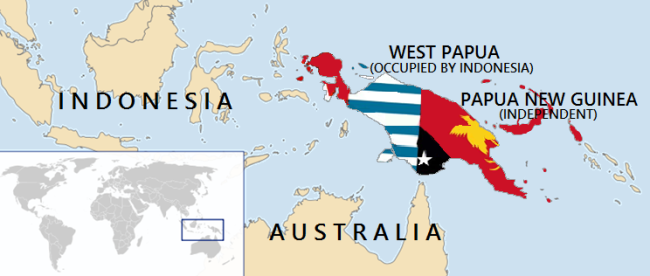by CAMELLIA WEBB-GANNON
 Map of West Papua IMAGE/Free West Papua
Map of West Papua IMAGE/Free West Papua
Introduction
This article argues that the democratic ideals espoused by Australia and Indonesia fall short in application to West Papua and West Papuans, and notes that such shortcomings are legitimated by mainstream media’s exoticist portrayals of West Papuans, particularly in Australia. The antidemocratic policies and processes of each government with regard to West Papua actually enable the (by and large) “good” bilateral relations at the state level to remain intact. However, this article contends that democracy, as practiced by civil society actors at the grassroots and digital network level in Australia and West Papua, creates cracks in the official Australia-Indonesia state relationship. Australian concerns over Indonesian human rights abuses in West Papua have traditionally been overlooked at the state level in favor of pursuing an amicable bilateral relationship.
However by forging digital activist networks locally and internationally—including building West Papuan-indigenous Australian partnerships, West Papuans are participating in a grassroots democratization process with global outreach, refusing to be sacrificed on the altar of regional realpolitik. The article concludes with a cautionary account of an apparent attempt by an opportunistic Australian political movement to hijack West Papuan democratization for its own ends, a threat West Papuan and Australian civil society activists are currently moving to contain.
West Papuans: cannibals or the sacrificed?
Who isn’t fascinated by a cannibal story – particularly one about a cannibal act purportedly planned in the past decade? In 2006, a weekly current affairs television show hosted by a popular Australian network aired a program introducing Wawa, a then six-year old boy its television crew met during a so-called first contact encounter with West Papua’s Korowai people. Wawa, the program alleged, was facing imminent cannibalization by his tribe for suspicion of witchcraft. A media fiasco followed in which the television network and its main rival raced to produce a “rescue Wawa” story. The rival’s controversial presenter was deported from West Papua for using a tourist visa, and Wawa was eventually taken from his home by the original network’s Sumatran tour guide to live in Jayapura and, later, Sumatra.
Earlier this year, a staffer of the first-mentioned current affairs program informed me that a follow up story on Wawa and the Korowai was being considered. The plan was to take Wawa on a return visit to Korowai land, ask him to compare his new school and city life with that of his village of origin, and assess how Korowai ways of life, including the practice of cannibalism, had changed since 2006.
This program concept illustrates the entrenched ignorance that pervades the mainstream Australian imaginary of West Papua and other parts of Melanesia. Anthropologist Rupert Stasch, the world’s preeminent scholar on the social relations of the Korowai, visited Wawa’s people after the media maelstrom and, through conversation with those who knew Wawa, found out that “there was a predictably wide gulf between the representations that had circulated in the international media and the boy’s actual history as understood by his kin and co-villagers (who were unaware of the media coverage)”1. Further, “almost all persons [Stasch] spoke with said that the exclusive reason the first film crew’s guide had been approached by villagers about taking the orphan to town was so that he would go to school, become literate in Indonesian, and return as a teacher, nurse, or government official. These numerous persons matter-of-factly denied […] suggestions that the boy had been rumored to be a witch, or had been in danger of being killed”2.
